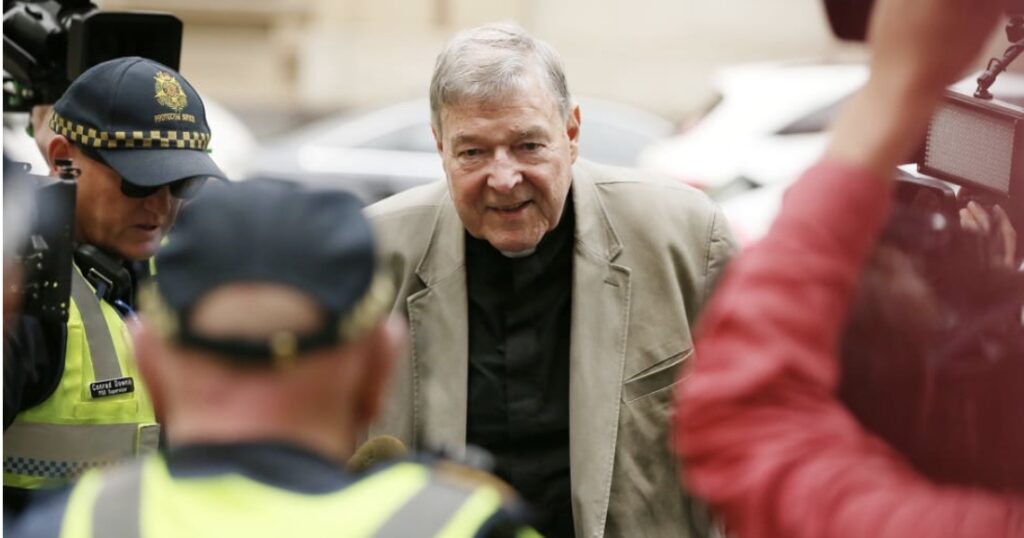[Melissa Dave’s | The Guardian] Cardinal George Pell, the most senior Catholic cleric ever convicted of child sexual abuse, has been taken in custody following a sentencing hearing in which his lawyer described one of Pell’s offences as a “plain vanilla sexual penetration case where the child is not actively participating”.
After the hearing, with Pell’s lawyer, Robert Richter, having withdrawn his application for bail, the chief judge said: “Take him away, please.” Pell was taken to a maximum security facility where he will be kept in protective custody and remain alone for up to 23 hours a day.
He will be sentenced on 13 March after his conviction for sexually assaulting two 13-year-old boys.
The Vatican on Wednesday also said its doctrinal department will open its own investigation into Pell. “After the guilty verdict in the first instance concerning Cardinal Pell, the Congregation for the Doctrine of the Faith (CDF) will now handle the case following the procedure and within the time established by canonical norm,” Vatican spokesman Alessandro Gisotti told reporters. A former US cardinal, Theodore McCarrick, was this month dismissed from the priesthood following a CDF investigation.
The former Australian prime minister John Howardwas among those who provided character references for Pell as the cardinal’s legal team tried to argue for a lower-end sentence in Melbourne’s county court on Wednesday morning.
Richter tried to argue there were “no aggravating circumstances” to one of the offences. It was “no more than a plain vanilla sexual penetration case where the child is not actively participating,” he told the court.
The chief judge, Peter Kidd, responded: “It must be clear to you by now I’m struggling with that submission. Looking at your points here – so what?”
He said he saw Pell’s behaviour as “callous, brazen offending” and “shocking conduct”.
“He did have in his mind some sense of impunity. How else did he think he would get away with this? There was an element of force here … this is not anywhere near the lower end of offending.”
Richter also tried to suggest that an incident in which Pell grabbed one of the boys by the genitals in an attack that lasted seconds was “fleeting” and not worthy of a jail sentence. Kidd disagreed.
“That wasn’t just a trifling sexual assault,” he said.
“Nothing is to be gained here by comparing different forms of sexual abuse of children. Of course I need to make a judgement of the overall gravity of this. But there is a limit to these kinds of comparisons.”
Abuse survivors and advocates present in the court gasped as Richter made his arguments for a lower-end sentence. He said at one point that if Pell’s victims were “truly distressed” after being abused, they would have returned to their homes exhibiting that distress.
Richter said he was in a difficult position because he could only propose a sentence based on the jury’s finding of guilt, not on the basis that Pell maintained his innocence. He said Pell did not have a pattern of offending and had not planned the attack, and so would have been “seized by some irresistible impulse”.
Kidd responded: “You put to the jury only a madman would commit these offences. The jury rejected that. There are no medical records suggesting he is mad. The only inference I can make is that he thought he could get away with it. People don’t go ahead and do what he did without thinking about it. People make choices.”
Prosecutors described Pell as having “a degree of callous indifference” as he “humiliated, degraded” and sexually abused the boys. This offending, prosecutors said, should attract a significant sentence.
Prosecutor Mark Gibson said the offending of Pell was serious, especially given his position of authority at the time.
“These acts … were in our submission humiliating and degrading towards each boy and gave rise to distress in each boy as referred to in the evidence [the complainant] gave. [The victim] recalled voicing objection.”
[Editor’s Note: This article was written by Melissa Dave’s and originally published at The Guardian. Title changed by P&P.]











